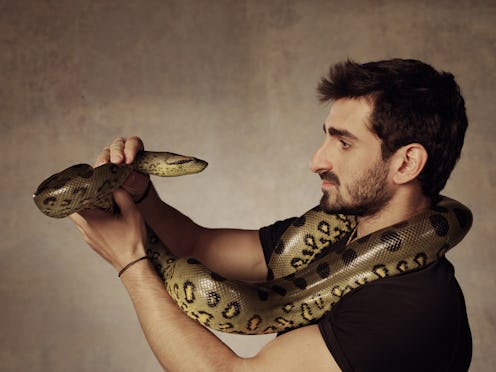
In case you haven't heard, the Discovery Channel is airing Eaten Alive, a documentary about a guy getting swallowed alive by an anaconda for no other reason than to see what it's like. Bustle's Kat George was right when she said "PETA will be SO pissed," because they are — understandably so. I don't always agree with the animal rights group, but PETA's response to Eaten Alive is totally on point. Their full statement slams everyone from the Discovery Channel to "wildlife expert" Paul Rosolie (the one being swallowed).
Not only does this publicity stunt sound far-fetched, it would also be lethal for the snake. Shame on this pseudo ‘wildlife expert’ for tormenting and likely killing an animal for a thrill, and shame on the Discovery Channel for giving him the incentive to do it. Whatever the filmmaker has planned, the snake will likely pay the ultimate price, as animals usually do when they’re used for entertainment. PETA has reached out to the Discovery Channel and asked them to pull the show, whether it is a hoax or not.
Though the Discovery Channel says it's already been filmed and the snake survived, PETA's allegations of animal abuse for the purpose of entertainment is totally legitimate.
Over the last decade or so I've seen a growing trend in animal shows that are there to frighten the audience or tap into some sort of gross spectator appeal. Gone are the days of Steve Irwin actually teaching us about crocodiles or Shark Week spending time talking about real sharks instead of Megalodons.
I grew up obsessively watching Animal Planet. Back in the 1990s and early 2000s, the channel was dedicated to teaching its audience about wildlife. Shows like The Really Wild Show took viewer questions to teach children about all kinds of animals and Wild Rescues showed animals' unique ability to save humans (and other animals) from danger. But gone are the days of actually learning about wildlife and their skills. Now it's all about the fear factor. Informative natural history programs have been replaced by dark titles like these examples.
- American Stuffers (a reality show about a taxidermy shop)
- Bad Dog! (about badly behaving pets)
- Monsters Inside Me (a series about parasites that live in humans)
- Your Worst Animal Nightmares (as you can imagine, this one is about animals causing harm to humans)
- Hillbilly Handfishin' (exactly what it sounds like, and 0 percent informational)
- Human Prey (more humans being attacked by animals)
- I Shouldn't Be Alive (humans that managed to escape from animal attacks)
- Killer Elephant (sewing fear, fear, and more fear)
But this isn't an issue just for Animal Planet. Years ago when the Discovery Channel first developed Shark Week in 1988 it was actually a week spent learning about sharks. Programs like Sharks on the Brink of Extinction and The Ultimate Guide: Sharks were aired to inform audiences about the majestic sea creature. In recent years the network has been a source of controversy when it changed its programming to be about 50 percent shark attack shows and 50 percent invented "documentaries" about giant sharks like the extinct Megoladon.
I get that humans like to be scared — the horror movie industry wouldn't be in business if not — but I don't think using animals is the way to do it. Employing animals to frighten people, or using them for entertainment purposes like Rosolie is doing for his anaconda program, is just wrong. It may seem all in good fun, it's just TV after all, but these decisions have real-world implications.
Continuously representing animals as dangerous gives people incentive to fear them and, in turn, kill them. Just look at what Jaws did to the shark population. Some species dropped 30-50 percent after the movie's premiere in 1975. "There was a collective testosterone rush that went though the U.S. in the years following Jaws," says shark biologist George Burgess. "Guys just wanted to catch these sharks so they could have their pictures taken with their foot on the head of a man-eater and the jaws later displayed on their mantle."
We don't need another show teaching us to fear an animal. Even if the Discovery Channel promises this specific anaconda didn't die, that doesn't mean it went through the process unscathed. It also doesn't mean other anacondas won't be killed as a result of people watching this now literally man-eating reptile.
More important than finding out what happens when a person goes into the belly of a snake is remembering that, most of the time, if we leave animals alone then they'll do the same to us. Shows need to stop making it look like all animals are out to get us — because it's a lie, and it's a dangerous mentality to perpetuate.
Image: Discovery Channel